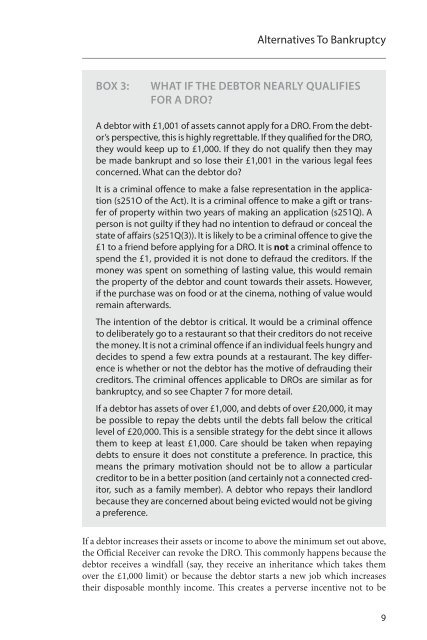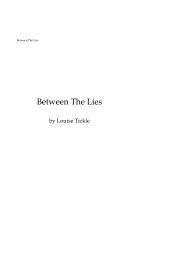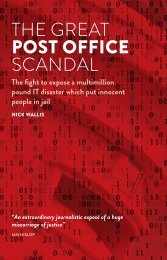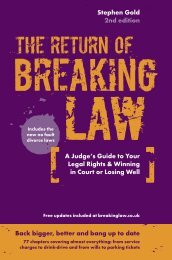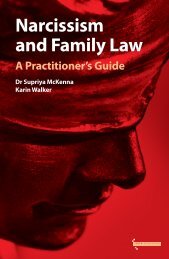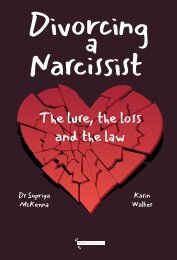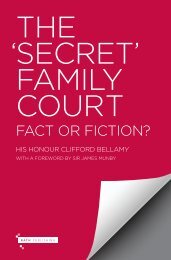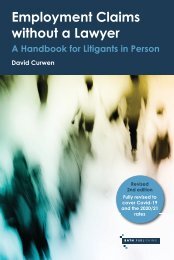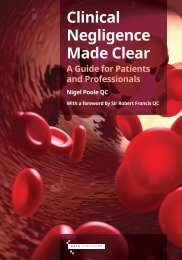Insolvency Made Clear: A Guide for Debtors
Plain English, practical guidance for anyone facing demands over a debt they are struggling to pay.
Plain English, practical guidance for anyone facing demands over a debt they are struggling to pay.
Create successful ePaper yourself
Turn your PDF publications into a flip-book with our unique Google optimized e-Paper software.
Alternatives To Bankruptcy<br />
Box 3:<br />
WHAT IF THE DEBTOR NEARLY QUALIFIES<br />
FOR A DRO?<br />
A debtor with £1,001 of assets cannot apply <strong>for</strong> a DRO. From the debtor’s<br />
perspective, this is highly regrettable. If they qualified <strong>for</strong> the DRO,<br />
they would keep up to £1,000. If they do not qualify then they may<br />
be made bankrupt and so lose their £1,001 in the various legal fees<br />
concerned. What can the debtor do?<br />
It is a criminal offence to make a false representation in the application<br />
(s251O of the Act). It is a criminal offence to make a gift or transfer<br />
of property within two years of making an application (s251Q). A<br />
person is not guilty if they had no intention to defraud or conceal the<br />
state of affairs (s251Q(3)). It is likely to be a criminal offence to give the<br />
£1 to a friend be<strong>for</strong>e applying <strong>for</strong> a DRO. It is not a criminal offence to<br />
spend the £1, provided it is not done to defraud the creditors. If the<br />
money was spent on something of lasting value, this would remain<br />
the property of the debtor and count towards their assets. However,<br />
if the purchase was on food or at the cinema, nothing of value would<br />
remain afterwards.<br />
The intention of the debtor is critical. It would be a criminal offence<br />
to deliberately go to a restaurant so that their creditors do not receive<br />
the money. It is not a criminal offence if an individual feels hungry and<br />
decides to spend a few extra pounds at a restaurant. The key difference<br />
is whether or not the debtor has the motive of defrauding their<br />
creditors. The criminal offences applicable to DROs are similar as <strong>for</strong><br />
bankruptcy, and so see Chapter 7 <strong>for</strong> more detail.<br />
If a debtor has assets of over £1,000, and debts of over £20,000, it may<br />
be possible to repay the debts until the debts fall below the critical<br />
level of £20,000. This is a sensible strategy <strong>for</strong> the debt since it allows<br />
them to keep at least £1,000. Care should be taken when repaying<br />
debts to ensure it does not constitute a preference. In practice, this<br />
means the primary motivation should not be to allow a particular<br />
creditor to be in a better position (and certainly not a connected creditor,<br />
such as a family member). A debtor who repays their landlord<br />
because they are concerned about being evicted would not be giving<br />
a preference.<br />
If a debtor increases their assets or income to above the minimum set out above,<br />
the Official Receiver can revoke the DRO. This commonly happens because the<br />
debtor receives a windfall (say, they receive an inheritance which takes them<br />
over the £1,000 limit) or because the debtor starts a new job which increases<br />
their disposable monthly income. This creates a perverse incentive not to be<br />
9


